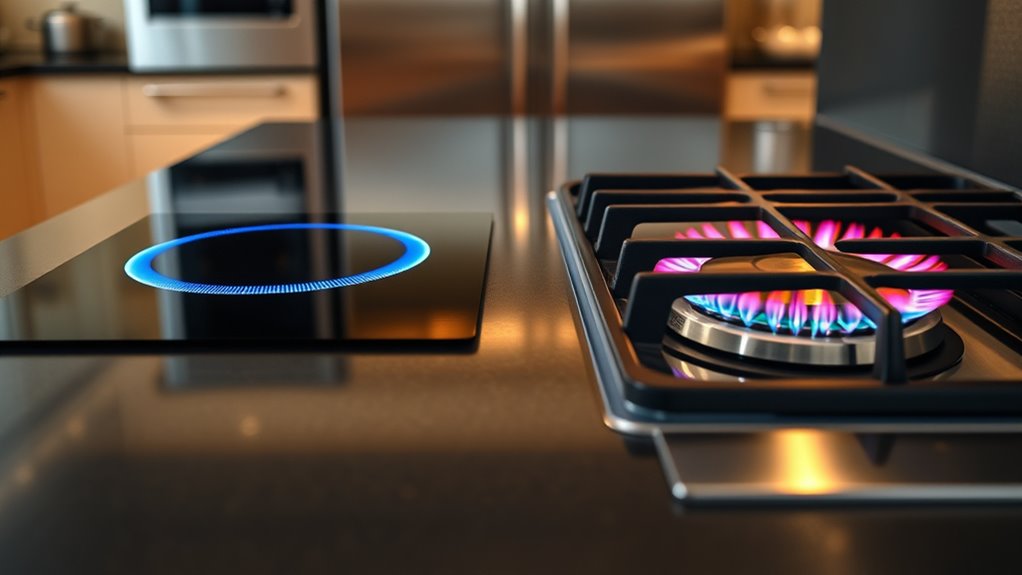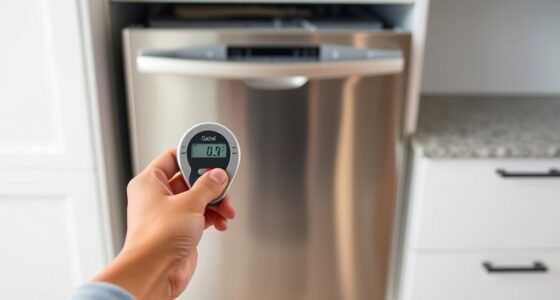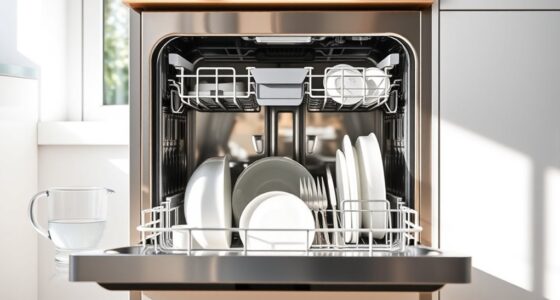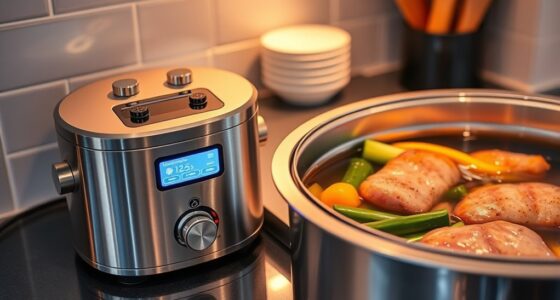Induction cooktops heat faster than gas because they generate heat directly within the cookware using electromagnetic energy, which allows for quick response times and precise control. Unlike gas, which relies on visible flames and external heat transfer, induction responds instantly to temperature adjustments. This means you’ll spend less time waiting for water to boil or food to simmer. If you want to discover more about their differences and benefits, keep exploring these options.
Key Takeaways
- Induction cooktops heat faster due to direct electromagnetic energy transfer, providing rapid heat compared to gas flames.
- Induction responds almost instantly to temperature adjustments, offering quicker control over cooking heat.
- Gas cooktops take longer to reach desired temperatures because heat is transferred via visible flames.
- Induction’s quick heating makes it ideal for rapid boiling and simmering tasks.
- Gas heating relies on flame size, which can be less precise and slower to change than induction’s electronic controls.
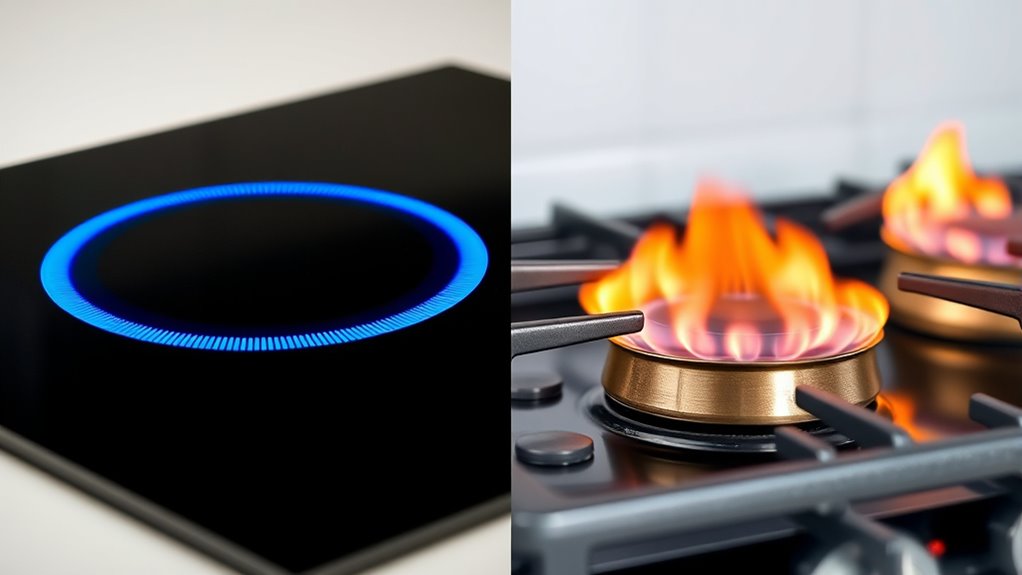
Have you ever wondered how induction and gas cooktops compare? When it comes to heating speed, both have their strengths, but understanding their differences can help you make an informed choice. Induction cooktops heat up faster than traditional gas models because they use electromagnetic fields to directly transfer energy to the cookware. This method means the heat is generated within the pan itself, not the cooktop surface. As a result, you get rapid response times and quick adjustments, which are essential when you’re trying to simmer or boil quickly. Gas cooktops, on the other hand, rely on visible flames to transfer heat through the cookware’s base. While they can reach high temperatures swiftly, they usually take a bit longer to heat up initially compared to induction.
Energy efficiency is another key factor to weigh up. Induction cooktops excel in this area because they convert a higher percentage of energy into actual heat. Since the heat is generated directly in the pan, less energy is wasted, and the cooktop surface remains relatively cool. This not only means faster cooking but also less energy consumption overall. Gas cooktops tend to be less efficient because much of the heat escapes into the surrounding air, making them more wasteful in terms of energy use. This efficiency difference can add up over time, especially if you cook frequently.
Cooking precision is another advantage induction cooktops offer. Because they respond so quickly to temperature adjustments, you can fine-tune your heat levels with remarkable accuracy. When you turn the knob or adjust the controls, the temperature changes almost instantaneously, giving you greater control over delicate sauces or simmering tasks. Gas cooktops provide a visual cue with the flame, but they’re less precise because the flame size doesn’t always correlate perfectly with temperature. You might find yourself adjusting the flame repeatedly to maintain a steady heat, which can be frustrating if you’re aiming for consistency.
Additionally, the color accuracy of induction cooktops is typically superior, as they do not rely on visual cues like flame size but instead respond directly to electronic controls, resulting in more consistent heat application.
Frequently Asked Questions
Do Induction Cooktops Work With All Types of Cookware?
You might wonder if induction cooktops work with all types of cookware. Generally, they require cookware with magnetic properties, so compatibility depends on the material. Induction limitations mean that non-magnetic pots and pans, like glass or aluminum, won’t work unless they have a magnetic base. To verify your cookware is compatible, look for labels or test with a magnet. If it sticks, your cookware should work effectively on an induction cooktop.
Are Gas Cooktops More Energy-Efficient Than Induction?
Imagine you’re in a time when energy was precious. Gas cooktops tend to consume more energy and have a higher environmental impact than induction models. While gas offers instant heat control, induction heats more efficiently, saving energy and reducing your carbon footprint. So, if you care about energy consumption and the environment, induction cooktops are the smarter, more eco-friendly choice, helping you cook faster and greener.
How Safe Are Induction Cooktops for Children?
You might wonder about child safety around induction cooktops. They’re generally safe because the cooktop surface stays cool, reducing burn risks. However, you should be aware of electromagnetic fields, which are emitted during use. While these fields are usually safe, it’s wise to keep children away from the surface when it’s on, and use safety features like child locks to prevent accidental activation.
Can Induction Cooktops Be Used During a Power Outage?
During a power outage, induction cooktops aren’t typically usable because they rely on electricity for power. If you need emergency cooking options, gas cooktops or portable butane stoves are more power outage compatible. You should prepare ahead by having alternative cooking methods on hand, especially in emergencies. Induction cooktops offer quick heating, but they’re not suitable when the power goes out, so plan accordingly.
Which Cooktop Type Offers Better Temperature Control?
Like a time-traveling chef, you’ll find that induction cooktops excel in precision heating and temperature stability. They respond quickly to adjustments, giving you greater control over your dishes. Gas cooktops, on the other hand, offer a more tactile feel but can be less consistent. If you want better temperature control, induction is your best bet, providing precise heat levels that help you perfect every recipe.
Conclusion
So, after all the hype about induction heating being faster, you might find yourself surprised that gas still holds its own. Ironically, the old-fashioned flame can sometimes heat up quicker and give you that classic, tactile control you crave. Maybe all those shiny new features aren’t worth sacrificing that instant, fiery response. Sometimes, the good old gas just proves that faster isn’t always better—and that’s a lesson only a true cook can appreciate.
